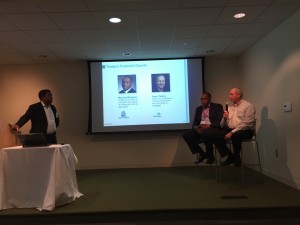 Last Thursday October 29th we invited the area’s top tech marketers to TechTarget’s headquarters in Newton, MA. for the 38th ROI Summit. We saw a strong turnout early for those interested in learning about the latest technology purchase trends and B2B marketing strategies. A snapshot into the key themes being discussed included:
Last Thursday October 29th we invited the area’s top tech marketers to TechTarget’s headquarters in Newton, MA. for the 38th ROI Summit. We saw a strong turnout early for those interested in learning about the latest technology purchase trends and B2B marketing strategies. A snapshot into the key themes being discussed included:
Understanding the Current IT Landscape
Jon Brown, Vice President, Market Intelligence at TechTarget started the morning by covering the latest technology research and purchase intentions trends in his presentation. A few of the takeaways for marketers included:
- Focus on APAC – lots of tech investment happening abroad
- Hottest Techs Trending in 2015
- IoT – in the ‘hype of hype’ state right now. ~18% of IT Buyers saying they’ll invest but this is heavily skewed from the Asia audience vs. North America.
- Software Defined Everything – driving change for Storage and Networking vendors
- Integrated, Hyperconverged Systems – 1 in 6 of our audience is active in this space
(This isn’t to ignore other technologies like Network Security which is consistently at the top of IT staff’s minds, however these are the topics with the most increase in research we’ve seen.)
Advice on How to Effectively Engage Technology Buyers – From Real Technology Buyers
 Our guest speakers Michael Woodson, C|CISO – CICP – CAMS – CEI – CHFI – CEH, Risk Director, VP Office of the CISO at State Street and Sean Tierney, Senior Vice President of Product Development and Technology at TechTarget provided valuable insight into their research process and buying team dynamics of actual technology purchases made within their organizations. We learned that on most new technology projects, a budget wouldn’t be determined until midway through the research process and was often reactively set. Initially they like to focus on identifying the correct needs and issues the project has to solve and thus BANT qualification would likely miss them as potential buyers.
Our guest speakers Michael Woodson, C|CISO – CICP – CAMS – CEI – CHFI – CEH, Risk Director, VP Office of the CISO at State Street and Sean Tierney, Senior Vice President of Product Development and Technology at TechTarget provided valuable insight into their research process and buying team dynamics of actual technology purchases made within their organizations. We learned that on most new technology projects, a budget wouldn’t be determined until midway through the research process and was often reactively set. Initially they like to focus on identifying the correct needs and issues the project has to solve and thus BANT qualification would likely miss them as potential buyers.
Listening to these needs, learning what a prospects strategy to fulfill those and building a relationship through dialogue and comfortable conversations are key for sales to reach them. Both Michael and Sean said they rarely see sales do this when approaching them.
The above points on how to positively engage IT buyers as a sales rep, and the fact that as a vendor you only have about 12.5% influence over a prospects buying journey highlight how important it is to get as much knowledge and data about your specific prospects as possible in order for sales to win more deals. This was further demonstrated through the results of a test email campaign set up by Courtney Kay, VP, Field & Product Marketing at TechTarget.
Courtney pulled the purchase intent data TechTarget has within Flash storage to identify the most active contacts and buying teams within the topic space. She changed the asset being offered in her series of email promotions to message prospects with downstream activity patterns with a late stage offer, and earlier stage prospects with a different offer. In doing so we were able to drive a 108% increase in CTR’s off a series of promotions. When used correctly, purchase intent data is a powerful tool to effectively engage your audience and increase lead conversion.
, Senior Vice President, Marketing at Dimension Data also spoke to how important an effective marketing and sales relationship is to converting prospects. When she first came to Dimension Data Pam sat on calls with sales reps to see how they handled leads and the types of conversations that were being had. As a former sales rep herself she was able to identify the gaps and disconnects between marketing and sales and come up with solutions to make sure both teams were working closely to more effectively engage their prospects. Now once a week everyone in marketing sits with sales to make sure everybody is on the same page, sales is kept in the loop on the latest marketing efforts through a weekly newsletter, and marketing provides sales with additional data on their prospects driven through their campaigns to drive more effective follow-up conversations especially around outbound leads.
Put the Buyer First In Your Content Strategy
Put function first, form second. Marketers have been conditioned to think about the success of their efforts in terms of pipeline, MQL’s etc. and not the effectiveness of their content or the buyer’s preferences as much as we should.
Taxonomies can help you do this. TechTarget’s own taxonomist doesn’t sit within any teams that create content so he is unbiased when classifying it. From this, we’re able to build our sites through contextually aligned content to very niche topics in a system that progressively drives technology buyers through the buy cycle. Having a strong taxonomy allows buyers to continue to consume your content and ensure you stay with them as they continue to move through their buying process.
Think Lifecycle, not just Buy Cycle. Paying attention to your prospects Lifecycle will 1. Improve customer experience and 2. Help identify when prospects need attention as seen by spikes in activity or consumption with specific content.
Create messaging for your partners. Oftentimes resellers or service providers get the first call technology buyers make when evaluating vendors or products. Infographics are ok as long as there is data for prospective buyers to consume.
https://twitter.com/Amandaatwork/status/659727110014148608
Give technical people the business language they need to convey your product to their business counterparts and vice versa. There isn’t a lot of content out there that does this and as a vendor, you can help by translating the technical factors into business terminology to influence both the technical and L.O.B. members of the buying team. Also, be more strategic in your messaging and illustrate how you are going to continue to help prospects solve their technology problems 3-5 years down the road.
Contextual alignment is crucial for breaking through the noise. With personalized ads popping up everywhere people go now, your prospects understandably get upset when your messaging shows up in irrelevant places. Make sure your content and ads are contextually aligned when they’re in front of your prospects to maximize their impact.
Putting it all together
These are some of the takeaways that you can implement now to start more effectively engaging buyers in your market today. If you would like to continue the conversation on any of these subjects, please leave a comment below or feel free to connect with me on LinkedIn.




